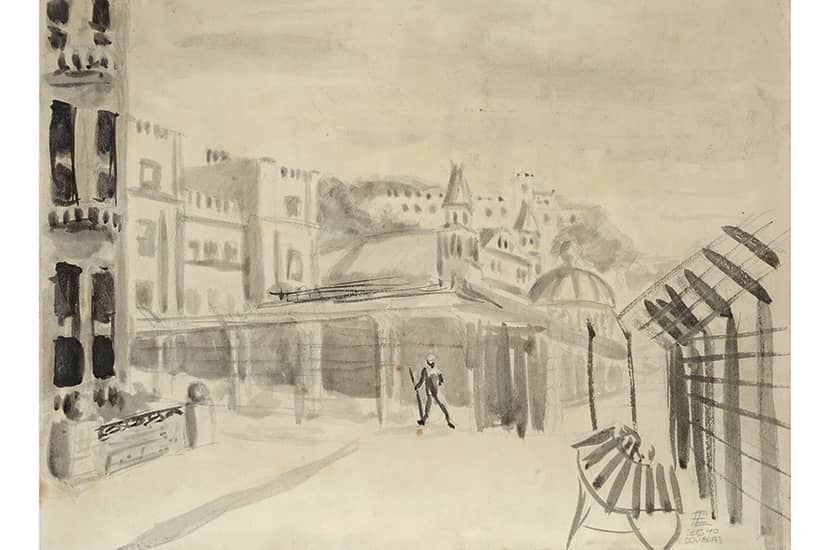Despite prostrate Germany’s need for the return of its men, in Britain we didn’t release our prisoners of war until 1948. In Russia — for those who survived — freedom came even later, in the 1950s; an apparent lack of moral equivalence saw the subject conveniently ignored until recently. Likewise, in a country that thrives on retelling wartime tales of derring-do, Britain has been slow to examine the complex story behind its internment of ‘enemy aliens’, the vast majority of whom were Jewish refugees. The horror of the Nazi concentration camps helped contribute to the silence on the subject post-1945, but, as Simon Parkin argues in The Island of Extraordinary Captives, that is no reason to avoid it.
The author made his name with A Game of Birds and Wolves, recasting the Battle of the Atlantic through the heroics of a retired captain and a team of Wrens in an onshore tactical unit based in Liverpool. His new book is equally rewarding.
For many Jews, internment on the Isle of Man was darkly reminiscent of their expulsion from Germany
Just 75,500 German and Austrian refugees were allowed into Britain before war was declared — and how we lauded our national effort to save them. Who hasn’t read a touching Kindertransport story? I’ve met several veterans who trained on the Isle of Man and recall no-go zones full of morbid-looking foreign men, but I’d never challenged myself to join up the dots until Parkin came along with his inimitable capacity to find the human pulse in the underbelly of Britain’s war.
There are heroes aplenty in The Island of Extraordinary Captives, which focuses on Hutchinson, one of Britain’s many internment camps on the Isle of Man, chock full of artists, musicians and intellectuals. With his eye for quirky detail, Parkin infuses the better known pre-war context with characters and incidents large and small, so that when war breaks out the reader is fully invested in his main protagonist Peter Fleischmann. He was an orphaned Jewish boy from Berlin with aspirations to become an artist until the Nazis got in the way. Cue Kindertransport to Britain; but, aged 17 and no longer little enough to be lovable, he was soon rounded up as posing a danger to the very state lauded for saving him.
Our wartime administration’s hamfisted response to fifth columnist fears makes for uncomfortable reading. Panic and unpreparedness are the hallmarks of poor governance, and Britain’s cruel knee-jerk response in 1940 to possible enemy invasion, the internment of thousands of mainly Jewish foreign nationals, was a case in point. That year The Spectator remarked: ‘Injustices have been committed that can never be repaired.’ As this book frequently underlines, for many of Hutchinson’s inmates the experience was darkly reminiscent of their expulsion from Germany.
Parkin is a good writer, but the strength of the history he has stitched together renders his more high-flown prose superfluous; the rich cast of characters speak for themselves. Fleischmann was surrounded by everyday heroes, many of them artists — and only one Jewish-German spy. Living up to his reputation as an investigative journalist, Parkin establishes that the spy was Ludwig Warchauer, a morally complicated character whose previous life had crossed paths with Fleischmann’s in Berlin.
It was a small world on the Isle of Man. The contacts Fleischmann forged there and the artistic talents he developed within a luminous coterie of internees saw the young man successfully broker a new life on release. A happy ending of sorts pivots the narrative arch back on itself: yes, indefinite incarceration was bad, but not in Fleischmann’s case. As Parkin observes, older prisoners felt the indignity and lack of certainty most acutely. After all, they had more invested in the outside world.
The Island of Extraordinary Captives is multi-layered and perhaps too long, but is definitely worth the deep dive into Britain’s inglorious war, when desperate men and women were disregarded, abused and left to fester in a humiliating no man’s land. It’s a reminder that conflict has always been a convenient mask behind which thuggery and xenophobia thrive. Yet, despite the stark injustice it describes, it is a curiously exhilarating read: an example of how individuals can find joy and meaning in the absurd and mundane. Peter Fleischmann did just that, and thankfully survived to tell his story.






Comments